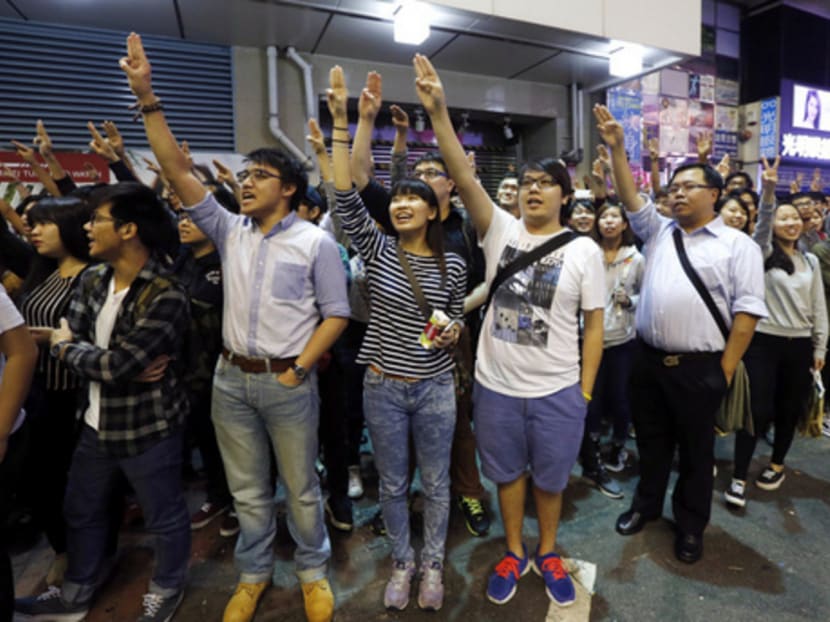In HK, tycoons and fishermen can tip the polls
HONG KONG — In a former fishing village, now packed with high-rise apartment blocks, Mr Law King-shing reflects on the quirk of history that made him one of the 1,200 elite that chose Hong Kong’s leader.

Hong Kong protesters imitating a three-finger salute from The Hunger Games movie in Mong Kok on Thursday. Protest leaders want any election committee to accept the candidates chosen by voters. Photo: Reuters
HONG KONG — In a former fishing village, now packed with high-rise apartment blocks, Mr Law King-shing reflects on the quirk of history that made him one of the 1,200 elite that chose Hong Kong’s leader.
Mr Law is one of 60 people on the election committee representing the agricultural and fisheries sector, which thrived in the city 40 years ago but now makes up less than 1 per cent of Hong Kong’s economy. A local politician, he is neither a fisherman nor a farmer.
“Many of the fishermen here are old and no longer work,” Mr Law, 55, said in his office in the coastal new town of Tsing Yi. “Many of them are illiterate.”
The presence of interest groups such as Mr Law’s on the committee that has selected the city’s three leaders since China recovered sovereignty in 1997 is both a problem and a potential solution for those trying to defuse two months of pro-democracy street sit-ins. China’s decision to use a similar panel to vet candidates for the city’s first popular election in 2017 set off the protests and the campaign to make it more democratic will continue long after the police clear the streets.
The city’s 1990 de facto Constitution, the Basic Law, calls for the Chief Executive to be elected by “universal suffrage”, though the candidates must be selected by a “broadly representative” nominating committee. Making that panel truly representative is an area where the government and democracy advocates say progress is possible.
In its August decision on the election framework, China said the committee would be based on the existing election commission and that all candidates would have to secure the support of more than half its 1,200 members, compared with the previous one-eighth. Protest leaders demand that any committee accept candidates chosen by Hong Kong voters.
Pro-democracy groups complain that the existing body is opaque and stacked with pro-China loyalists.
The four main sectors of the committee — industrial, commercial and financial services; professions; labour, social and religious groups; and city and local politicians — are supposed to reflect Hong Kong society. Each has 300 votes. Critics say adopting the same structure means China, not voters, will control the process and exclude anyone it does not like.
While Chief Executive Leung Chun-ying has said student demands that ordinary citizens nominate candidates would violate the Basic Law, he has suggested that the composition of the panel may be altered. Mr Leung was selected with 689 votes in 2012.
A detailed look at the current system shows that less than 4 per cent of Hong Kong’s seven million people were eligible to vote for its members in 2011. Of the almost 238,000 voters, including 16,000 groups ranging from Friends of the Art Museum to the Hong Kong Tai Chi Association, only 65,565 participated.
In Mr Law’s agriculture and fisheries subsector, the 60 uncontested candidates were chosen by 158 voters from trade associations, including the Hong Kong branch of the World’s Poultry Science Association and four corporate groups that represent “fish culture” in an area called Sai Kung.
Beijing officials “never gave any explicit guidance” on whom to vote for in 2012, but messages circulating in the election committee made it clear what the preferred outcome was, Mr Law said.
The number of committee members from agriculture and fisheries is double that of accountants, lawyers or architects, while some occupations are not represented. “There is absolutely no justification for that,” said Mr Edward Chan, a former judge who has served on all three election committees.
The government is due to hold another round of public consultation before the end of the year on the implementation of China’s election proposal. Hong Kong Cabinet member Regina Ip has said that changes to the committee could include giving some of the 60 seats now reserved for agriculture and fisheries to new groups such as the student protesters.
“We’re all hoping for some way forward, but there are some very strong vested interests involved,” said Ms Anson Chan, the city’s former No 2 official, who now heads a pro-democracy group. “Unless the government is willing to take a very strong lead and knock heads together, we won’t make progress.” BLOOMBERG





